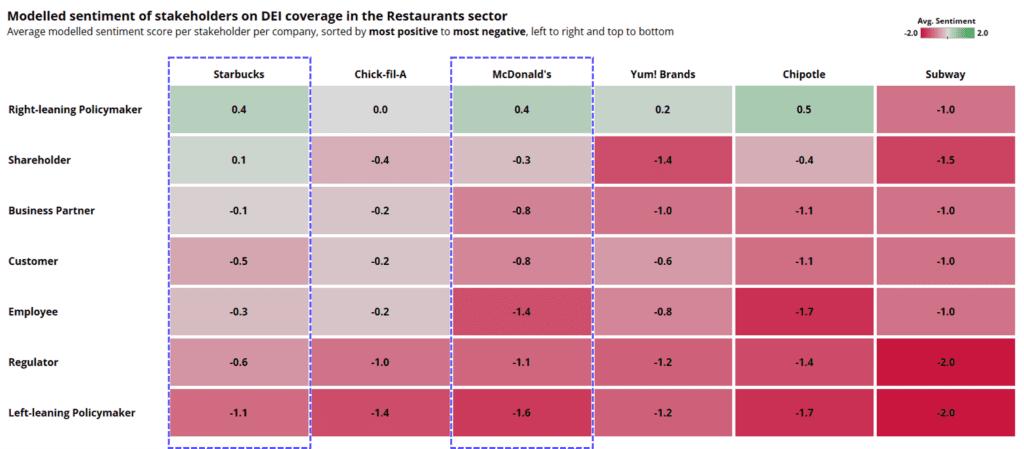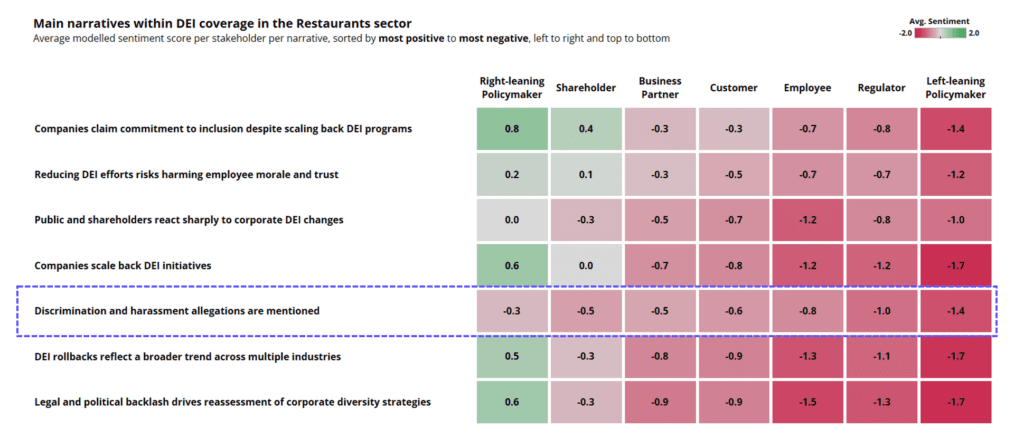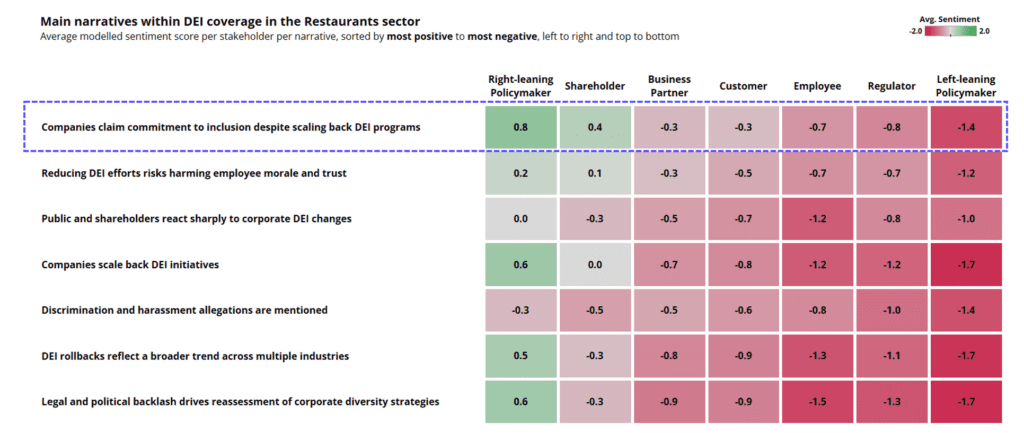Diversity, Equity, and Inclusion (DEI) remain critical pillars for corporate reputation, especially in industries as public-facing as the restaurant sector. PublicRelay’s Q1 Benchmark 2025 dataset, which analyzed media from 50 companies across nine sectors, shines a spotlight on how DEI initiatives (or the rollback of these initiatives) impact corporate reputation through the eyes of key stakeholders. Using a stakeholder-centric methodology, PublicRelay examined media sentiment across seven key personas: Customers, Shareholders, Employees, Business Partners, Regulators, Left-Leaning Policymakers, and Right-Leaning Policymakers.
Methodology: Understanding Stakeholder Perceptions
Using PublicRelay’s AI-enabled model, our Insights & Analytics team analyzed high-relevance articles published in the Top 50 English-language outlets, assigning sentiment scores ranging from -2 (very negative) to +2 (very positive). Unlike traditional sentiment analysis, which aggregates public opinion broadly, this model assesses sentiment specifically from each stakeholder perspective, allowing for nuanced insights into how different groups react to DEI narratives.
This multi-dimensional analysis provides companies with a granular understanding of reputation risks and opportunities tied to DEI. For example, while policy rollbacks might receive tepid reactions from shareholders, they can trigger sharp negativity among employees or left-leaning policymakers. This divergence underscores the importance of targeted messaging that considers stakeholder-specific concerns.
Key Findings: Stakeholder Reactions to DEI in the Restaurant Sector
1. Starbucks and McDonald’s: Leaders in DEI Narratives
Despite media coverage of policy changes, Starbucks and McDonald’s maintained some of the most positive DEI sentiment. Starbucks’ rollback of its open-door policy generated surprisingly limited backlash, largely due to messaging around employee safety concerns, transparency around the new guidelines, and reiterating that this policy has long been common among retailers. In contrast, McDonald’s policy adjustments concerning staff and suppliers were met with sharper criticism, particularly from employee-focused narratives. The company tempered this by referencing its progress on prior DEI goals and commitment to inclusion in a widely released note.

2. Silent Players: Flying Under the Radar
Brands like Yum! Brands and Chipotle managed to avoid significant negative coverage despite DEI-related controversies. For example, Yum! Brands appeared on a Trump administration “hit list,” yet received minimal individual media attention. Chipotle removed DEI language from its annual report, but its refusal to comment effectively stunted media momentum.
3. Political Influence on DEI Perception
One of the more surprising findings was the consistency of negative sentiment around discrimination allegations even among right-leaning policymakers. This indicates that DEI missteps transcend political alignment, reinforcing that discrimination narratives are broadly reputationally damaging.

4. The Impact of Positive DEI Messaging
Mentions of company commitments to inclusion can moderate reactions to reported DEI rollbacks across nearly all stakeholder groups.

Shifting Narratives: How DEI Messaging Can Mitigate Reputational Risk
The data reveals that not all DEI-related coverage is equal. Companies that preemptively communicate their commitment to diversity and equity—especially during policy shifts—are better positioned to temper backlash. For brands navigating DEI changes, aligning messaging with core values and stakeholder expectations is crucial.
Communicate Continuity, Not Just Change
When companies announce DEI rollbacks or adjustments, framing the conversation around ongoing commitments can mitigate negative reactions. As we’ve seen, McDonald’s was able to somewhat cushion backlash by referencing prior DEI achievements and its long-term inclusion goals. This contextualizes the change as part of a broader, evolving strategy rather than an abandonment of principles.
Leverage Leadership Voices
Adding authentic statements from CEOs or other executives can lend credibility to inclusion commitments. Media coverage that included executive-level assertions of company values saw more balanced stakeholder reactions, as it provided a counter-narrative to headlines focused solely on policy changes.
Anticipate Stakeholder Reactions
Understanding the specific concerns of different stakeholders allows companies to craft more resonant messages. Shareholders, for example, leaned more neutral to rollback announcements, contradicting media assumptions that these moves would be positively received. Meanwhile, employees and policymakers were notably more reactive to discrimination-related coverage.
Avoiding the Media Frenzy
Brands like Chipotle demonstrated that strategic silence can sometimes be effective. By declining to comment on DEI language removal, Chipotle prevented the story from gaining traction. While not always a viable strategy, selective engagement with the media can minimize narrative escalation.
Conclusion: Prioritizing Perception
For companies in the restaurant sector, DEI narratives carry significant reputational weight. Proactive communication, stakeholder-centric messaging, and strategic leadership involvement can help mitigate backlash and maintain positive sentiment across key personas. In an era where DEI is both a corporate expectation and a media focal point, mastering the narrative is essential for brand resilience.
Learn more about how PublicRelay’s Benchmark insights can guide your stakeholder strategy. Connect with us.
Author: Kay Kavanagh, Director of Research